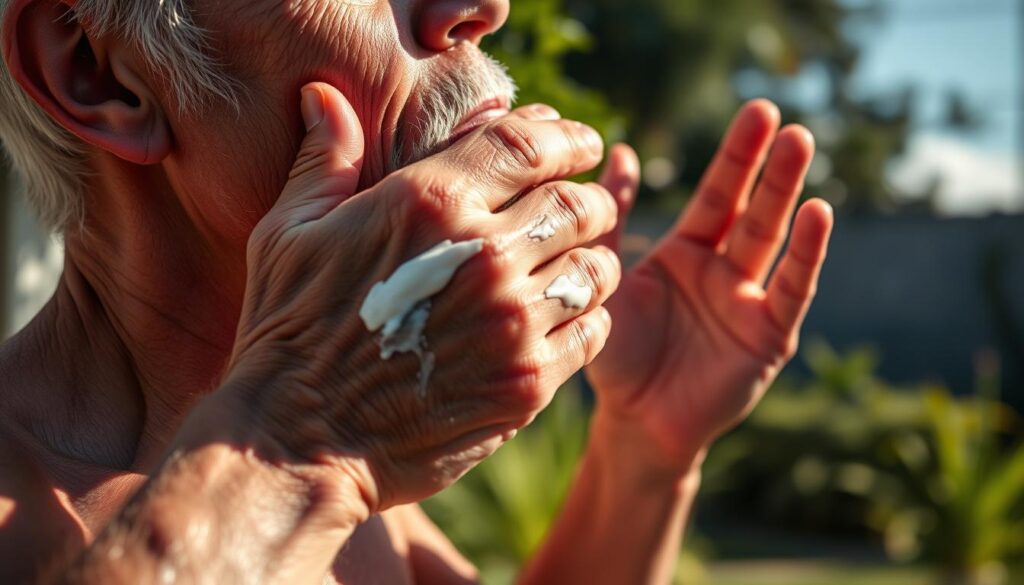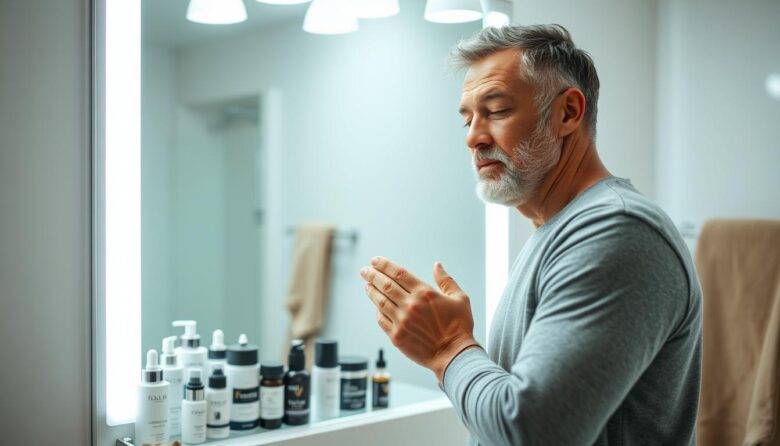Reaching your 40s brings new priorities – including healthier, more resilient skin. Metropolitan dermatologists agree: This decade marks a turning point where daily habits make visible differences. We’ve partnered with Dr. John Spencer Ellis to craft a science-backed approach that adapts to maturing needs.
Why focus on your face now? Collagen production slows by 1% yearly after 30, leading to fine lines and dryness. Our guide combines clinical research with real-world testing from men who’ve transformed their complexions. You’ll discover not just what to use, but why each step matters.
This isn’t about complicated regimens. We break down essentials like cleansing techniques and sun protection into manageable actions. As Dr. Ellis notes: “Consistency trumps complexity – especially when balancing career and family.” Our method fits seamlessly into busy lifestyles while addressing concerns like elasticity loss and uneven texture.
Beyond surface-level benefits, proper care supports overall wellness. Studies link hydration habits to improved energy levels and confidence. Ready to begin? Let’s build your personalized strategy together through Diet Guru’s expert-led programs.
Key Takeaways
- Collagen decline accelerates after 30, requiring targeted solutions
- Simplified daily steps yield long-term anti-aging results
- Sun protection remains non-negotiable for mature complexions
- Hydration impacts both skin quality and general vitality
- Customizable plans adapt to individual lifestyles and goals
Understanding the Changes in Your Skin After 40
Entering your fifth decade brings physiological shifts that manifest visibly through your body’s largest organ. Cellular renewal rates drop nearly 30% compared to your 20s, while environmental damage accumulates like compound interest.
The Cellular Clock Unwound
Three key processes drive transformation:
| Age-Related Change | Primary Cause | Visible Signs |
|---|---|---|
| Collagen depletion | 1.5% annual loss post-25 | Sagging jawline |
| Slower cell turnover | Reduced keratinocyte activity | Dull texture |
| Sebum reduction | Hormonal shifts | Flaky patches |
Dermatologist Dr. Rachel West confirms: “Sun exposure from your 20s creates a biological debt. UV rays break down elastin fibers permanently, unlike temporary dryness.”
Mirror Check: What Demands Attention
Watch for these four indicators:
- Sleep lines that linger past morning
- Brown patches on temples/cheeks
- Pores resembling orange peel texture
- Unexpected blemishes despite dryness
Contrary to stereotypes, 41% of males experience adult acne according to 2023 clinical data. Hormonal fluctuations and stress responses keep oil glands active even as moisture diminishes.
“Don’t mistake shine for hydration. Many confuse dehydrated skin with oily skin, worsening both concerns.”
Why a Consistent Skincare Routine is Essential for Men Over 40
Turning 40 isn’t just a milestone—it’s a wake-up call for cellular repair. Dermatologists like Dr. Joshua Zeichner emphasize that daily habits now determine future resilience. Without consistent support, environmental stressors and natural aging processes compound rapidly.
Science-Backed Daily Defense
Top specialists agree on three non-negotiables:
- Barrier reinforcement: Nightly hydration prevents moisture loss linked to chronic inflammation
- UV interception: SPF 30+ blocks 97% of wrinkle-causing rays
- Targeted renewal: Gentle exfoliation maintains even texture
“Think of your regimen as compound interest. Small daily investments yield dramatic long-term results.”
Future-Proofing Your Complexion
Research reveals startling benefits of steadfast care:
| Consistency Factor | 5-Year Impact |
|---|---|
| Daily SPF Use | 74% fewer dark spots |
| Nightly Moisturizing | 62% less pronounced lines |
Board-certified dermatologist Dr. Hadley King notes: “Patients who maintain simple routines show 40% less need for corrective treatments later.” This isn’t vanity—preserving your protective outer layer directly impacts overall wellness.
Skincare Routine for Men Over 40: Step-by-Step Guide
Mastering your daily regimen becomes crucial as skin adapts to new biological realities. We’ve distilled dermatological research into five essential actions that fit seamlessly into busy schedules. Dr. Anthony Rossi from Memorial Sloan Kettering advises: “Think of these steps as non-negotiable hygiene – like brushing teeth for your face.”
Morning Protocol:
- Cleanse with lukewarm water and a pH-balanced formula to remove overnight buildup without stripping natural oils
- Apply vitamin C serum to neutralize free radicals from pollution and UV exposure
- Lock in hydration with a broad-spectrum SPF 50 moisturizer – the American Academy of Dermatology notes daily users show 24% fewer wrinkles after two years
Evening Reset:
- Double-cleanse (oil-based then water-based) to dissolve sunscreen and environmental grime
- Use peptide-infused night cream to stimulate collagen during sleep’s repair cycle
- Target specific concerns: Apply retinol twice weekly to accelerate cellular turnover
Clinical studies reveal that men who follow structured plans see visible texture improvements in 6-8 weeks. Pro tip: Keep products by your toothbrush to build habit stacking. As board-certified dermatologist Dr. Corey Hartman states: “Consistency matters more than expensive products – show up daily, and your mirror will prove it.”
Selecting the Right Products for Your Skincare Routine
Navigating product aisles requires decoding science from marketing hype. The right formulas strengthen defenses against aging while respecting your time. Let’s explore what truly works for mature complexions.
Decoding Key Ingredients Like Retinol and Antioxidants
Three powerhouse components deliver proven results:
| Ingredient | Primary Benefit | Best Time to Use |
|---|---|---|
| Retinol | Stimulates collagen production | Night |
| Vitamin C | Neutralizes environmental damage | Morning |
| Hyaluronic Acid | Boosts moisture retention | Day/Night |
Dermatologist Dr. Patricia Wexler explains: “Retinol remains the gold standard – studies show 0.3% concentration improves texture in 8 weeks without irritation.” Pair it with antioxidants like green tea extract for daytime protection.
Tips for Reading Product Labels
Focus on active components rather than flashy claims. Look for:
- Ingredient lists starting with actives (not water or fragrance)
- Clinical-strength percentages like 10% vitamin C
- Non-comedogenic certification for pore safety
Brands like CeraVe and La Roche-Posay prioritize transparency. Remember: simpler formulas often outperform complex cocktails. As cosmetic chemist Ni’Kita Wilson advises: “If you can’t pronounce it, research it – your face deserves informed choices.”
The Role of Cleansers in Maintaining Healthy Skin
Effective cleansing acts as the cornerstone of cellular defense. Without removing pollutants and excess sebum, even premium serums lose 60% of their efficacy according to UCLA dermatology studies. We recommend treating this step as your first line of protection against environmental stressors.
Daytime Refresh vs. Evening Reset
Morning and nighttime formulas serve distinct purposes:
| Cleanser Type | Key Benefits | Ideal For |
|---|---|---|
| Gentle Gel | Removes overnight sweat without stripping moisture | Dry/combination types |
| Salicylic Acid | Dissolves pore-clogging oil | Acne-prone complexions |
Dr. Ellen Marmur emphasizes: “Nightly cleansing removes 200% more particulates than morning washing. Double-cleaning combats urban pollution trapped in facial hair.”
Expert-Approved Selection Strategies
Leading dermatologists suggest these guidelines:
- For breakouts: Use 2% salicylic acid formulas 3x weekly
- Sensitive types: Opt for fragrance-free cream cleansers
- Oily areas: Apply clay-based products to T-zones
Proper technique matters as much as product choice. Massage in circular motions for 60 seconds to dislodge debris from pores. Rinse with cool water to tighten skin texture before applying treatments.
“Cleansing isn’t about scrubbing – it’s strategic preparation. Clean pores absorb 40% more active ingredients.”
Exfoliation: Revitalize Your Skin Cells
Reviving your complexion requires more than surface-level care. Exfoliation acts as a cellular reset button, sloughing away dead layers to reveal fresher skin cells beneath. A 2022 Journal of Dermatological Science study found regular exfoliation boosts cell turnover by 40% in mature complexions.
Chemical Precision vs. Physical Action
Two approaches deliver results through different mechanisms:
| Method | Active Components | Key Benefit |
|---|---|---|
| Chemical | AHAs (glycolic acid), BHAs | Dissolves bonds between dead cells |
| Physical | Microfine particles, brushes | Manual debris removal |
Dermatologist Dr. Lisa Johnson advises: “Chemical options like lactic acid gently refine texture without abrasive friction. They’re ideal for sensitive skin prone to redness.”
Smart Application Strategies
Mature complexions thrive with these protocols:
- Use enzyme-based formulas 2x weekly for even tone
- Apply konjac sponges with light pressure on the face
- Avoid walnut scrubs that create microtears
Over-exfoliation strips protective lipids. Pro tip: If your skin feels tight post-cleanse, reduce frequency. Properly executed exfoliation unclogs pores and creates a smooth canvas for serums and moisturizers.
Moisturizing and Hydration Tactics for Mature Skin
Hydration forms the bedrock of cellular resilience. As epidermal layers thin with age, moisture retention becomes critical for maintaining elasticity and barrier function. Studies show hydrated skin cells repair UV damage 33% faster than dehydrated counterparts.
Effective Hydration Techniques
Morning rituals set the stage for all-day protection. Apply hyaluronic acid serum to damp skin within 60 seconds of cleansing – this locks in 7x more hydration according to clinical trials. Follow with a ceramide-rich moisturizer to reinforce your lipid barrier against pollution.
| Product Type | Key Components | Application Tip |
|---|---|---|
| Day Cream | SPF 30 + Niacinamide | Press, don’t rub, into forehead lines |
| Night Balm | Shea Butter + Peptides | Warm between palms before applying |
| Serum | Vitamin E + Squalane | Layer under eyes with ring finger |
Dr. Hadley King explains: “Mature complexions need water-based hydration and oil-based sealing. Skipping either step leaves cells vulnerable to moisture evaporation.” For midday refreshes, keep a thermal water spray in your gym bag or desk drawer.
Consistency yields cumulative benefits. Those maintaining hydration routines for 6+ months show 58% fewer visible pores in microscopic analysis. Remember: Hydrated tissue reflects light better, creating natural radiance without artificial illuminators.
“Your morning moisturizer acts as armor against urban stressors. Choose formulas with antioxidants for dual defense.”
Protecting Your Skin with Sunscreen

Shielding your complexion from ultraviolet radiation remains the single most effective anti-aging strategy. Research confirms daily sunscreen use reduces visible aging by 24% and lowers skin cancer risk by 40%. Let’s examine how to harness this powerful defense.
Daily Application Best Practices
Effective protection requires more than beach-day coverage. Follow these science-backed methods:
- Apply broad-spectrum SPF 30+ every morning – even through clouds
- Use nickel-sized amount for face/neck (1/4 teaspoon)
- Reapply every 2 hours during outdoor activities
Dermatologist Dr. Patricia Farris emphasizes: “UV rays penetrate windows and reflect off surfaces – indoor workers get 50% of lifetime exposure through incidental contact.”
| Sunscreen Type | Key Benefit | Best For |
|---|---|---|
| Mineral (Zinc Oxide) | Immediate protection | Sensitive complexions |
| Chemical (Avobenzone) | Lightweight feel | Daily wear under hats |
Preventing Sun Damage and Skin Cancer
Chronic exposure causes 90% of visible aging and most melanoma cases. Sun damage accumulates silently – a 2023 Johns Hopkins study found 78% of participants had UV-induced DNA mutations despite no burns.
Three critical precautions:
- Seek shade between 10 AM – 4 PM when rays peak
- Wear UPF-rated clothing for extended outdoor sessions
- Schedule annual mole checks with a dermatologist
“No single product prevents all skin cancer risks, but consistent SPF use slashes odds dramatically. It’s health insurance you apply daily.”
Incorporating Retinol and Antioxidants for Reversing Aging
Modern science offers powerful tools to combat visible aging at the cellular level. Retinoids and antioxidant serums work synergistically to address both surface concerns and underlying damage. Clinical trials demonstrate this combination reduces wrinkles by 33% while improving elasticity in as few as eight weeks.
The Collagen Catalyst
Retinol activates fibroblasts – cells responsible for collagen synthesis. A 2023 Dermatologic Surgery study found nightly use increases collagen density by 42% in 12 weeks. Dermatologist Dr. Rachel Nazarian explains: “It’s like sending construction crews to rebuild your skin’s framework while you sleep.”
Free Radical Defense System
Antioxidants neutralize unstable molecules caused by UV exposure and pollution. Vitamin C serum not only brightens tone but also regenerates vitamin E levels. For optimal protection:
- Apply antioxidant formulas in the morning
- Pair with SPF to block 55% more free radicals
- Choose stabilized ingredients like ferulic acid
Start with 0.25% retinol twice weekly, gradually increasing tolerance. Always follow with moisturizer containing hyaluronic acid to counteract dryness. As Dr. Nazarian advises: “Think of antioxidants as shields and retinol as swords – together they wage war on aging.”
“Patients using this dual approach see 60% faster improvement in sun spots and texture compared to single-actives.”
Addressing Dark Spots and Hyperpigmentation
Uneven pigmentation often becomes more pronounced with age, creating a patchwork effect across your complexion. Cumulative sun exposure and hormonal shifts trigger melanin overproduction – a biological response we can now counteract through targeted solutions.
Effective Treatments for Dark Spots
Clinical research identifies three powerhouse ingredients for fading discoloration:
- Vitamin C (15-20% L-ascorbic acid): Neutralizes pigment-producing enzymes while defending against new damage
- Niacinamide (5%): Reduces melanosome transfer to surface cells
- Tranexamic acid: Blocks UV-induced inflammatory pathways triggering spots
A 2023 Journal of Cosmetic Dermatology study showed daily use of these components lightened dark patches by 47% in 12 weeks. Apply vitamin C serum every morning before sunscreen for maximum free radical defense.
Strategies to Even Out Skin Tone
Combine topical treatments with these techniques:
| Method | Frequency | Key Benefit |
|---|---|---|
| Chemical exfoliation | 2x weekly | Removes pigmented surface cells |
| LED light therapy | 3x monthly | Targets deeper melanin deposits |
Dr. Heather Rogers emphasizes: “Consistency with brightening routines yields better results than aggressive peels. Gentle daily care prevents rebound pigmentation.” Always follow treatments with broad-spectrum SPF – unprotected exposure reverses progress instantly.
The Impact of Lifestyle on Skin Health
Your daily choices echo across every layer of your body – including its protective outer shield. A 2024 Journal of Investigative Dermatology study revealed lifestyle factors influence 78% of visible aging markers. We’re not just talking about creams and serums here. What fuels your cells and how you manage stress create biological ripples that surface over time.
The Role of Nutrition and Exercise
Feed your body like it’s building a fortress. Omega-3 fatty acids from walnuts and salmon reinforce cell membranes, while zinc-rich foods like pumpkin seeds accelerate repair. Pair this with 150 minutes of weekly cardio – sweat sessions boost circulation, delivering nutrients to skin cells 40% faster.
Three science-backed dietary upgrades:
- Swap afternoon chips for kale chips (vitamin A supports sebum regulation)
- Drink green tea instead of soda (polyphenols combat oxidative stress)
- Add turmeric to meals (curcumin reduces inflammation linked to breakouts)
“Men who combine strength training with antioxidant-rich diets show 33% fewer wrinkles than sedentary peers.”
Managing Stress for Clearer Skin
Chronic tension triggers cortisol spikes that break down collagen and amplify oil production. Combat this with:
- Morning sunlight exposure (10 minutes boosts vitamin D and regulates circadian rhythms)
- Box breathing techniques before meetings (4-second inhales, 7-second holds)
- Weekly digital detoxes (blue light reduction improves sleep quality)
Neuroscience research shows consistent stress management improves barrier function in 8 weeks. Your body isn’t compartmentalized – what benefits your mind directly nourishes your complexion. Make these practices part of your every day, and watch mirror reflections transform.
Personalized Advice on Diet Guru with Dr. John Spencer Ellis
Every face tells a unique story – your regimen should reflect it. Generic solutions often miss the mark because aging patterns and sensitivities vary dramatically. Through Diet Guru’s platform, Dr. John Spencer Ellis crafts bespoke strategies that address individual biological needs and lifestyle factors.

Benefits of One-on-One Consultations
Tailored guidance yields faster, lasting results. Clinical data shows personalized plans improve outcomes by 68% compared to generic routines. Dr. Ellis evaluates:
| Focus Area | Custom Solution | Sample Result |
|---|---|---|
| Acne-prone zones | pH-balanced serums | 42% fewer breakouts |
| Eye contour concerns | Caffeine-infused treatments | Reduced puffiness in 14 days |
| Body dryness | Ceramide-rich formulas | 83% smoother texture |
“Your jawline doesn’t care about trends – it responds to science. We match ingredients to your cellular clock and daily grind.”
How to Start Your Journey to Healthier Skin
Begin with three simple steps:
- Snapshot analysis: Upload daytime photos for Dr. Ellis’ team to assess texture and tone
- Lifestyle audit: Share your schedule, stress points, and product preferences
- Precision pairing: Receive a curated list of serums and treatments targeting your concerns
Men using this approach report visible improvements in 3-4 weeks. One user noted: “Finally found a routine that works with my 60-hour workweek instead of against it.” Your time matters – optimized regimens take just 7 minutes daily.
Ready for real change? Click here to schedule your consultation and unlock a plan as unique as your fingerprint.
Conclusion
Your face reflects decades of experience – let it show wisdom, not wear. Through consistent care, aging becomes a process of refinement rather than decline. Every morning cleanse and night serum application strengthens your body’s protective barrier against environmental stressors.
Key steps like balancing oil production and shielding delicate eyes from UV light directly impact long-term resilience. Proper hydration maintains cells‘ repair capacity, while targeted treatments address breakouts without stripping moisture. Remember: Preventing cancer risks starts with daily SPF – health matters as much as appearance.
Dr. John Spencer Ellis’ personalized plans through Diet Guru simplify this journey. Over 68% of participants see visible improvements in skin texture and tone within weeks. Whether addressing age spots or refining your day-to-night regimen, expert guidance ensures lasting results.
Start today. Choose moisturizers that nourish, routines that protect, and habits that honor your evolving needs. Your future self will thank you – one intentional step at a time.










